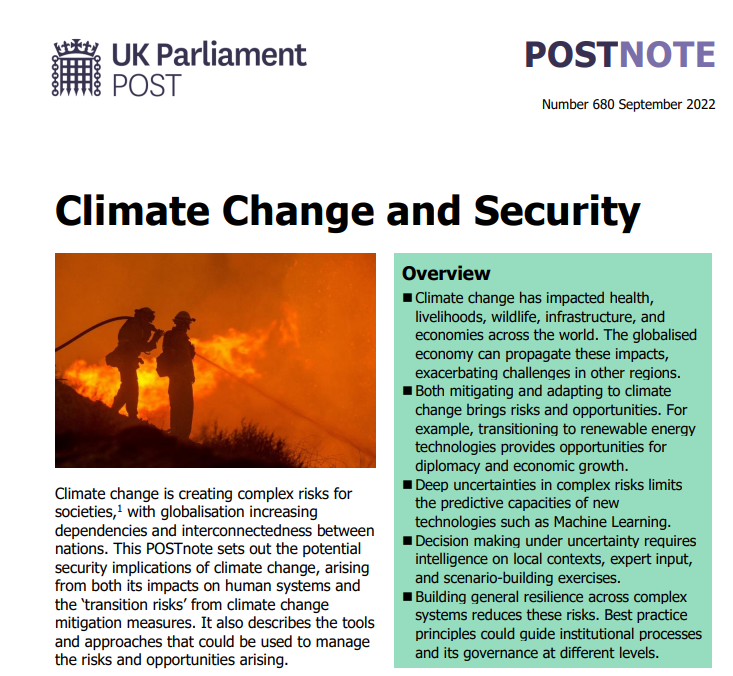Engaging in policy learning through POST: Helping MPs to understand Climate Change and Security
Experiences from Rowena and Rich’s POSTnote engagement and lessons to do the same
By Haya Fakoush | Published on 11 October 2022
Categories: Nottingham Civic Exchange; Research; School of Social Sciences;

Supporting colleagues to share their expertise that will inform societal thinking is at the heart of what we do at Nottingham Civic Exchange. We specialise in policy engagement using knowledge exchange and impact to develop change and make a difference using our School's collective expertise. Alongside this facilitative role we also practice what we preach to showcase our own expertise that shape debates and policy issues with a current focus on labour market exploitation, disaster and emergency management alongside some smaller projects.
Last week we got to read the fruits of our policy engagement through the publication of a POSTnote (briefing for MPs and wider society on emerging areas of research interest via the UK Parliament’s POST team) on climate change and security. These four page briefing documents gather together a wide body of evidence to keep parliamentarians up to date on key issues and we had been invited to support the creation of one based on our research, expertise and skills. We wanted to share our experience of doing this and highlight how you can do the same to help engage in policy debate and development where it connects with your research and practice work.
Over the summer we (Professor Rowena Hill and myself) had been invited to contribute to a POSTnote on climate change and security by the lead author Ben Clarke. Four distinct parts of our portfolios spoke to this briefing. Our expertise is based on our work supporting the National Police Chief Council’s lead for climate security which has led us to explore how climate issues and terminology should be considered across UK Policing now and into the future helping them to plan for the future. Secondly, Professor Hill successfully secured an ESRC Policy Fellowship at the Department for Levelling Up, Housing and Communities exploring how climate related policy can be informed by psychology, particularly in relation to climate readiness, mitigation, adaptation and impact management. Thirdly we were both invited to support a GoScience Foresight development project this year to help government colleagues to explore and plan against a set of future assumptions and scenarios up to 2050. We have also recently developed and tested a Nottingham Expert Advisory Panel that brings together leading academic thought from both of our cities universities to support strategic responses to key future issues through the Universities for Nottingham programme.
As a way of sharing your expertise, it was an enjoyable albeit a little depressing process (depressing due to the weight of challenges we all face when tackling the climate crisis). We were tasked with answering a set of questions, sharing links and proposing issues and avenues for further investigation based on our expertise and knowledge. Following initial meetings, we then reviewed our discussion and developed further material and responses. When the draft was complete we were then tasked with reviewing it before release seeking to ensure it balanced views and was a clear document within the strict four page limit.
Taking part in this process was both rewarding and enjoyable and did feel like our work and expertise was recognised. It is another way to help share your expertise and broaden the range of people who see your name as a knowledgeable and engaged academic. It also challenged us to consider what the key questions were and developed our skills in communicating complex topics for targeted audiences. We have promoted its publication and will be using the insights from the POSTnote in our ongoing work with the NPCC to ensure the case is made for broad and deep work across government to tackle to impacts of climate change and security for citizens, agencies and local and national governments.
So why should you care?
POSTnotes are a great example of clear communication tool for an informed but non-expert audience. They showcase issues deemed to be of importance to MPs and can act as a conduit to showcase your research and expertise in the policy world. We recommend all colleagues track the development and release of POSTnotes connected to your topic areas (they publish a schedule and reach out to experts before they work them up) in the same way you might monitor Parliamentary Select Committee and Government Consultation calls. The wider POST team is a valuable resource for colleagues to connect to.
If you are interested in knowing more about how to connect with parliament or government or want a broader discussion about engaging with policy do reach out to us at Nottingham Civic Exchange or pop along to our policy drop-ins held across City (Thursday 1 December) and Clifton (Thursday 3 November) throughout the year.
Click here to read the Climate Change and Security POSTnote and view others relevant to your work via the POSTnote library.
Nottingham Civic Exchange
Nottingham Civic Exchange has been established by Nottingham Trent University to maximise research, policy and practical impact by bringing together university expertise with partners seeking to address the needs of communities. Nottingham Civic Exchange acts as a resource to look at social and economic issues in new ways. This means facilitating debate, acting as a bridge between research and policy debates, and developing practical projects at a local, city and regional level.
Visit our website - www.ntu.ac.uk/nce Contact us - notts.civicex@ntu.ac.uk Follow us - @NottsCivicEx